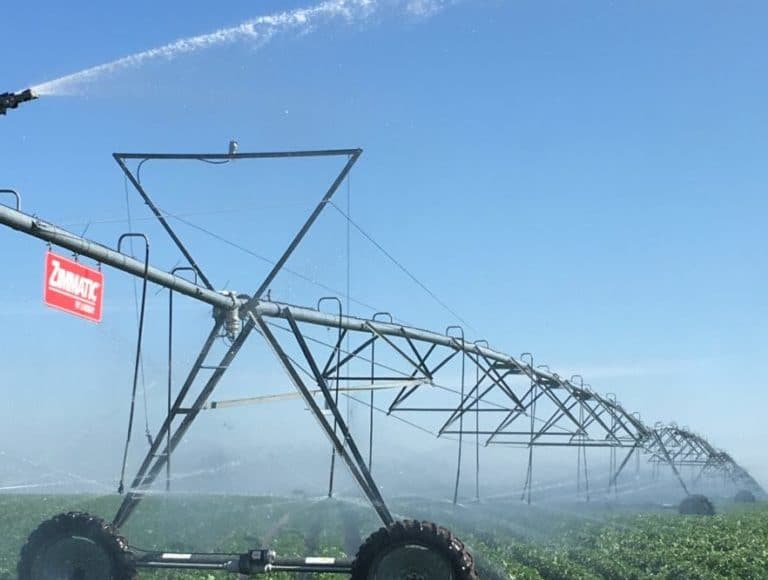The Saskatchewan potato industry has the opportunity to expand after the government announced a $4-billion irrigation expansion — decades after it was initially planned.
Farmers in Saskatchewan were beginning to believe it would never happen. At the start of July, the Saskatchewan government surprised them though and announced they’d finally be expanding the irrigation infrastructure at Lake Diefenbaker.
Excitement quickly followed. The horticulture industry in Saskatchewan saw the expansion as an opportunity for them and breathed a sigh of relief after decades spent lobbying.
“It’s been a long, long road. Just a lot of podium talk and no real action on the ground. So, it’s about time Saskatchewan has this,” Matthew Lawless, president of the Saskatchewan Seed Potato Growers’ Association (SSPGA), says in a phone interview.
Outside of Saskatchewan, provincial counterparts shared a mix of excitement and disbelief. Like their Saskatchewan peers, they had spent decades waiting for the Prairie province’s potato industry to expand.
“I was quite surprised really…I’m surprised at the magnitude of the announcement. That kind of blows me away,” Kevin MacIsaac, general manager of the United Potato Growers of Canada, says in a phone interview.
The $4 billion-decade long project will see Saskatchewan’s irrigation area expand by 500,000 acres in three stages. And while the project is just getting started, it’s been decades in the making.
Building Lake Diefenbaker
The 1930s devastated Saskatchewan. The agricultural province found itself stuck in a drought, unable to grow anything, with dust blowing everywhere.
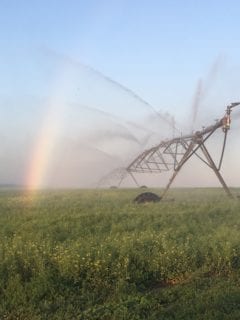
As the province and country made its way out of the drought, the federal government looked into how it could prevent the devastation from happening again. The government came up with a solution and they developed a long-term assistance and drought alleviation agency — the Prairie Farm Rehabilitation Administration (PFRA).
PFRA projects sprouted up all across the Prairies, shelterbelts began to dot the landscape. In Saskatchewan, attention centred on the area around the South Saskatchewan River.
During the 1940s and 1950s, the PFRA developed a proposal for water storage on the South Saskatchewan River. The project would irrigate an estimated 455,000 acres of land in central Saskatchewan by constructing a dam across the river near Outlook and just above the mouth of the Coteau Creek.
From 1958 to 1968 the Gardiner and Qu’Appelle dams were constructed, creating the 200-kilometer long Lake Diefenbaker, named after John Diefenbaker — the 13th prime minister of Canada and only prime minister to be from Saskatchewan. In the 1970s work started on the west side irrigation project, but it was abandoned after a change in government.
Over the decades the lake produced electricity through the Coteau Creek Hydroelectric Station. It also provided water to several potash mines, a canola processing mill, an alfalfa processing plant and an ammonium nitrate producer. The lake also supplied irrigation for about 110,000 acres of land along its east side.
While growers along the east side of Lake Diefenbaker were able to make use of the lake with irrigation equipment, their counterparts on the west side were left without the option. Farmers on the east side were able to grow potatoes and other horticultural crops, alongside wheat and other traditional field crops.
With only one side of Lake Diefenbaker being used for irrigation, farmers there have worked hard to keep a potato industry going in the province. In 1994, seed growers across the province joined together to create the SSPGA, with growers from other parts of the province also being members.
The province has become known for its seed potatoes which have increased plant vigour and can produce higher yields than seed from regions further south, the province of Saskatchewan says on its website. Saskatchewan has unique growing conditions with its long, sunny days and cool nights.
Over the past decade, potato production in the province has fallen slightly from around 7,000 to 6,000 acres. This year there was 6,000 acres planted, according to Statistics Canada.
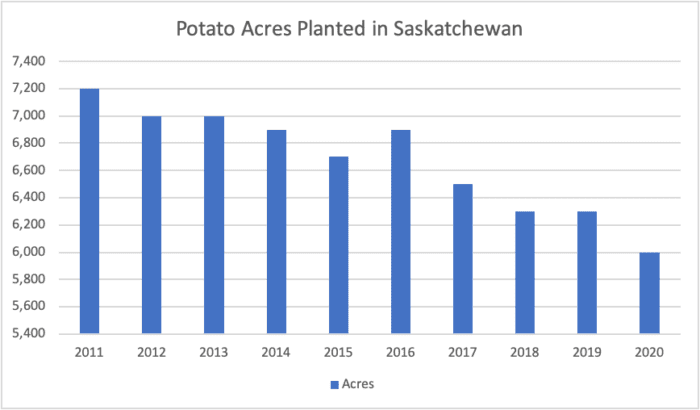
A Dream Realized
Potato production could be on the rise in the future though. On July 2, the Saskatchewan government announced a $4 billion-decade long project to expand the province’s irrigation by 500,000 acres in three stages.
“We think the opportunity is now and we think the we’ve squandered opportunities in the past,” Lyle Stewart, legislative secretary to the minister responsible for the Water Security Agency, says in a phone interview. “Diefenbaker was designed for a million acres (of irrigation). It will be far short on that once this is done, but we will have a million acres of irrigation around the province.”
The first stage of the project was set to begin immediately after the announcement and will see construction completed on the abandoned west side irrigation system. There will be $22.5 million put into the rehabilitation and expansion of the existing west side irrigation system.
Phase two will see further expansion of the west side project by adding an additional 260,000 acres of irrigable land. This will provide irrigation near the communities of Macrorie, Milden, Zealandia, Delisle and Asquith.
The final phase will see the buildout of the Qu’Appelle South Irrigation Project, adding an estimated 120,000 acres of irrigation. The irrigation system will start at Lake Diefenbaker and run south through the areas near Tugaske, Eyebrow, Marquis and into Buffalo Pound Lake.
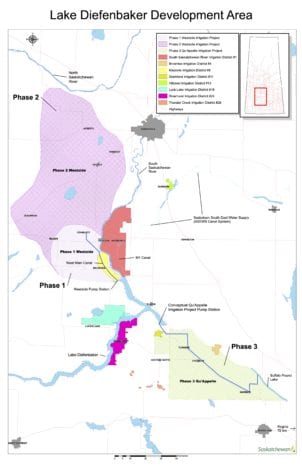
The irrigation expansion will provide growers with the infrastructure to connect their farms to irrigation systems. From there, farmers will be in charge of growing what crops they see fit and selling them themselves.
“I would say kudos to the growers there and the government there for supporting agriculture the way they are,” MacIsaac says in an interview from Prince Edward Island. “It’s impressive because the area where I live in, you can’t get a permit to irrigate.”
Across the country options for expanding irrigation is slim. In Alberta, they are approaching their water allocations for irrigation of potatoes. In Manitoba, there is limited access to water for expansion. Ontario is already largely irrigated and in P.E.I. the government has placed restrictions on building more irrigation. In Quebec, they’ve only recently built irrigation infrastructure in the last decade.
Saskatchewan is “probably the one area, part of the country that’s got the most opportunity because there’s the most available arable land that’s not irrigated,” explains MacIsaac. Saskatchewan has flat, wide open fields making it ideal for potato production.
An Optimistic Future
Despite announcing the project in the midst of the COVID-19 pandemic, which has saw the potato market upended due to service industry closures, the provincial government, led by the Saskatchewan Party, believes this is the right time for it.
“We’ve been told by processors that we have the right heat units, warm sunshine hours in the summer, a long enough growing season to grow anything, great soil and everything except enough irrigation to guarantee supply for large processors,” Stewart says.
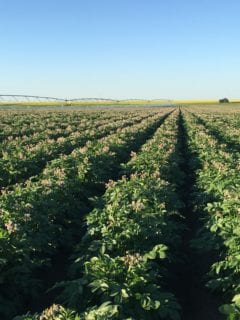
French fry processing has been expanding over the past few years across the Prairies. Cavendish Farms opened a new plant in Lethbridge, Alta. last year while J.R. Simplot Company has expanded its plant at Portage la Prairie, Man.
The province has been talking with major processors, Stewart explains. Well he won’t give details on which processors they have been talking with, he says none of the processors have plants in Manitoba.
Lawless isn’t as optimistic a processing industry will be established in the province. But he does think they can see expansion in the seed and fresh potato industries. While the majority of fresh potatoes in the province are grown locally, some are imported from out of province but with the expansion they could become self-sufficient possibly.
“Saskatchewan already has a reputation for disease and virus-free, very vigorous seed of high quality,” Lawless says. “If we can grow more of that and gain a larger market share across Canada and into the U.S. with our seed potatoes, that’s a good thing.”
Saskatchewan will have to sort out some logistical issues though if a processing expansion happens. When the seed industry first established itself in the province, they had to solve some shipping issues, and MacIsaac expects similar problems will arise for the processing industry.
Saskatchewan is located further away from large marketing areas for processed potatoes similar to Idaho, which is the largest potato producing region in the United States, MacIsaac explains. “So, there is possibility there, but it takes time to develop this whole infrastructure in the system that goes along with the actual potato plant.”
While the first steps to grow the Saskatchewan potato industry may have been taken with the irrigation expansion announcement, there is still a lot of work the potato industry will need to do to make it a reality.

